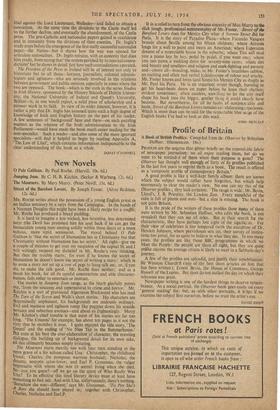New Novels
o Pale Galilean. By Paul Roche. (Harvill. 10s. 6d.)
MR. ROCHE writes about the possession of a young English priest in an Italian seminary by a satyr from the Campagna. In the hands of a Norman Douglas this might have been a likely recipe for a soufflé; Mr. Roche has produced a bread pudding.
It is hard to imagine a less wicked, less inventive, less determined satyr (the Devil has promised him his soul back if he can get the immaculate young man' sinning solidly within three days) or a more tedious, more tepid seminarist. The moral behind 0 Pale Galilean is 'that the secret of Humanism lies in Christianity but that Christianity without Humanism has no secret.' All right—give me a couple of minutes to get over my suspicion of the capital H, and I will willingly suspend my disbelief in Mr. Roche's rosy thinking. But then the trouble starts; for even if he knows the secret of Humanism he doesn't know the secret of writing a story: which is to write a story not set up a row of pegs to hang talk on; or, if you do, to make the talk good. Mr. Roche does neither; and as a result his book, for all its careful construction and able character- isation, fails either to entertain or instruct.
The stories in Jumping Joan range, as the blurb gleefully points out, 'from the uncanny and supernatural to crime and horror.' Mr. Kitchin is a sort of provincial Algernoon Blackwood who has read The Turn of the Screw and Wells's short stories. His characters are determinedly unpleasant, his backgrounds are zealously ordinary. Evil and madness and ugliness romp like puppies down his seaside terraces and suburban avenues—and about as frighteningly. Merry Mr. Kitchin's chief trouble is that most of his stories are far too long. 'The Cousins' for example, has about ten pages in it not the sixty that he stretches it over. I quite enjoyed the title story, 'The Gourd' and the ending of `No Nice Tea in the Summerhouse.' But even at his best the over-elaboration of character, the crawling dialogue, the building up of background detail for its own sake, all this ultimately becomes simply irritating.
It is a relief to turn from the obvious sincerity of Miss Murry to the slick tough, professional sentimentality of Mr. Foster. Street of do Barefoot Lovers does for Mexico City what A Narrow Street did for Paris. It is the story of Paradise Plaza—where Facundo Vasquez broods about Seville among his fifteen children; where Antonia longs for a wall to paint and meets an American; where Esperanza dreams of a respectable house in the suburbs; where Tito will steal you a piano key by key, pedal by pedal, if you want one; where you can pawn a wedding dress for seventy-nine cents; where dirt and beauty and smallpox and religion and cock-fighting and poverty and—above all—breeding, make, in Mr. Foster's breathless cahlese, an exciting and often real verbal kaleidoscope of' colour and cruelty. Mr. Foster knows and loves (and hates) his Mexico City as deeply as Mr. Paul his Paris. He is an impatient writer though, bursting to get his heart-beats down on paper before he loses their rhythm; strident sometimes; often careless, unw:Iling, to let the city itself shape his book into the bigger, gentler this it could clearly have become. But nevertheless, for all its faults of sentimcnIality and haste, Street of the Barefoot Lovers remains an xhilarating experience. Which is more than can be said for the respectable blue sec ge of the English books I've had to look at this week.
JOHN METCALF


































 Previous page
Previous page